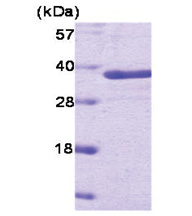PTPN1 (1-321) Human Protein
Other products for "PTPN1"
Specifications
| Product Data | |
| Species | Human |
| Expression Host | E. coli |
| Expression cDNA Clone or AA Sequence |
MEMEKEFEQI DKSGSWAAIY QDIRHEASDF PCRVAKLPKN KNRNRYRDVS PFDHSRIKLH QEDNDYINAS LIKMEEAQRS YILTQGPLPN TCGHFWEMVW EQKSRGVVML NRVMEKGSLK CAQYWPQKEE KEMIFEDTNL KLTLISEDIK SYYTVRQLEL ENLTTQETRE ILHFHYTTWP DFGVPESPAS FLNFLFKVRE SGSLSPEHGP VVVHCSAGIG RSGTFCLADT CLLLMDKRKD PSSVDIKKVL LEMRKFRMGL IQTADQLRFS YLAVIEGAKF IMGDSSVQDQ WKELSHEDLE PPPEHIPPPP RPPKRILEPH N
|
| Predicted MW | 37.3 kDa |
| Concentration | lot specific |
| Purity | >95% by SDS-PAGE |
| Buffer | Presentation State: Purified State: Liquid purified protein Buffer System: 25 mM Tris-HCl, pH 7.5, 2 mM β-mercaptoethanol, 1 mM EDTA, 1 mM DTT, 20% Glycerol |
| Bioactivity | Specific: . Enzymatic activity was confirmed by measuring the amount of enzyme hydrolyzing 1 nmole of p-nitrophenyl phosphate (pNPP) per minute at 37°C, pH 7.5 using 10 mM of substrate. Activity Assay 1. Prepare a 200 ul reaction mix into a suitable container: The final concentrations are 10 mM Tris (pH 7.5), 50 mM NaCl, 2 mM DTT, 1 mM MnCl2, 10 mM pNPP. 2. Pre-warm reaction mix in heat block at 37°C 3. Add recombinant PTP1B solution with various concentrations (2ug, 3ug, 4ug) in 200 ul reaction buffer. 4. Mix by inversion and Incubate at 37°C for 10 minutes. 5. Stop the reaction by adding the 800 ul of 0.1N NaOH. 6. Record the absorbance at 405nm |
| Preparation | Liquid purified protein |
| Protein Description | The protein coding region of the catalytic domain of PTPN1 (PTP-1B) (amino acids 1-321) was cloned into an E. coli expression vector. The catalytic domain of PTP-1B was overexpressed in E. coli as a soluble protein, and it was purified by conventional column chromatographic techniques. |
| Storage | Store undiluted at 2-8°C for up to two weeks or (in aliquots) at -20°C or -70°C for longer. Avoid repeated freezing and thawing. |
| Stability | Shelf life: one year from despatch. |
| Reference Data | |
| RefSeq | NP_001265547 |
| Locus ID | 5770 |
| UniProt ID | P18031, B4DSN5 |
| Cytogenetics | 20q13.13 |
| Synonyms | PTP1B |
| Summary | 'The protein encoded by this gene is the founding member of the protein tyrosine phosphatase (PTP) family, which was isolated and identified based on its enzymatic activity and amino acid sequence. PTPs catalyze the hydrolysis of the phosphate monoesters specifically on tyrosine residues. Members of the PTP family share a highly conserved catalytic motif, which is essential for the catalytic activity. PTPs are known to be signaling molecules that regulate a variety of cellular processes including cell growth, differentiation, mitotic cycle, and oncogenic transformation. This PTP has been shown to act as a negative regulator of insulin signaling by dephosphorylating the phosphotryosine residues of insulin receptor kinase. This PTP was also reported to dephosphorylate epidermal growth factor receptor kinase, as well as JAK2 and TYK2 kinases, which implicated the role of this PTP in cell growth control, and cell response to interferon stimulation. Two transcript variants encoding different isoforms have been found for this gene. [provided by RefSeq, Jul 2013]' |
| Protein Families | Druggable Genome, Phosphatase, Transmembrane |
| Protein Pathways | Adherens junction, Insulin signaling pathway |
Documents
| FAQs |
Resources
Recombinant Protein Resources |
{0} Product Review(s)
0 Product Review(s)
Submit review
Be the first one to submit a review
Product Citations
*Delivery time may vary from web posted schedule. Occasional delays may occur due to unforeseen
complexities in the preparation of your product. International customers may expect an additional 1-2 weeks
in shipping.






























































































































































































































































 Germany
Germany
 Japan
Japan
 United Kingdom
United Kingdom
 China
China
